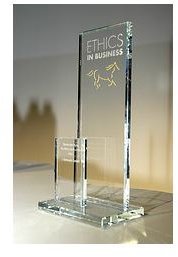Business Cases Ethics: A Look at Cases of Scrutinized Business Ethics
Business Ethics: Is This an Oxymoron?
Are the words business ethics an oxymoron? They can be, if you’re telling a joke and that’s the punch line, but in the real business world, shameful practices of business ethics are rampant. It’s possible to avoid the temptation and instead rely upon your name, your product, and your personality traits to ensure your business ethics remain in tact.
In the day-to-day operations of running your business, you can be faced with personal business ethics, legal ethics, and plain old business ethics. How you choose to handle these depends upon your character, your willingness to be profitable yet trustworthy as well as honoring what you say you’ll do for a customer, vendor, employee or professional associate.
There have been some famous business ethics cases and here, we’ll take a look at personal business ethics, business ethics, and legal ethics and how, when violated, they can play a big part in business, often a very detrimental part.
Does Oprah Winfrey Hate Cows?
People in powerful positions often use their personal ethics to influence business. Between 1996 and 1998, Oprah Winfrey may have done just this when she interviewed an author on her famed television talk show who told America, if dead livestock (cows) are fed to living cows, it would result in Mad Cow’s Disease; Oprah agreed and went on a rampage. By using her powerful image, Oprah has been able to turn unknown authors and their books into overnight sensations. In the Mad Cow debacle, however, some ranchers in Texas blamed the dramatic price drop of beef on Oprah’s words. Oprah was cleared in a lawsuit filed by the Texas ranchers but even today, with only three reported cases of Mad Cow’s Disease in the US, did Oprah’s personal ethics affect the drop in cattle prices? Because Oprah based her comments on the findings of an author on her show with what Texas ranchers called, “without sound scientific proof,” it appears she did use her personal influence and power to turn the cattle industry around, at least for a short time. A sure way to have avoided this was to keep personal reactions off the airways.
Bernie’s Scandal
In 2009, Bernie Madoff plead guilty to eleven charges that were directly related to his Ponzi scheme. Cheating investors out of approximately $65 billion dollars, including non-profit investors. This was probably one of the biggest business/personal ethics case ever. Madoff practiced his Ponzi scheme by paying off his old investors with money from new investors and was also found guilty of money laundering, perjury, and fraud. When a person, who is trusted, well known, and at a level of power on Wall Street as Madoff was, when his ethics ran awry, it affected individuals, corporations, small business investors, and non-profits who trusted Bernie to build up strong endowment funds. A person’s personal ethics, if bad as in this case, do play a part in the business world by the direct actions of the individual. If Madoff had some personal ethics, his business ethic debacle would have never happened.
The “I Will Make You Money People”
So we don’t violate journalism ethics, we can leave the names of the “I will make you money people,” to the imagination of the reader, but they are making millions. There are preachers who ask for your money so they can pray that you’ll make money. There are motivational groups and individuals who hold costly seminars and sell books and tools so even the downtrodden will succeed. Here we find legal ethics stepping in as these types seem to fly in between the legal and the illegal, protected by both federal and state laws. If the promise-of-money-person gains money by selling ideas that don’t work, is that legal? To some it is, yet to others, especially the people who sign up to participate in these businesses at first they may feel the sky’s the limit, only to fail. The people who don’t succeed are accused of not following the materials or plan in the correct matter, hence it’s not the fault of the “I will make you money people.”
Summing Up Business Ethics
As a business owner as you venture out each day, begin with a plan to be ethical. Those who twist deals, understate income, and cheat customers with unreliable or faulty products willingly, are not ethical and won’t gain customer loyalty. To be a successful entrepreneur, and be void of falling into the business ethics trap, find ways to do things that will make your professional associates, employees, and customers trust you. That will make you money.
